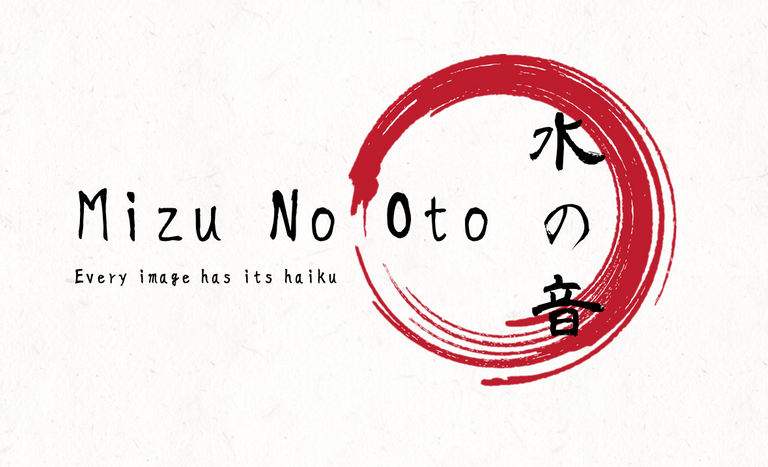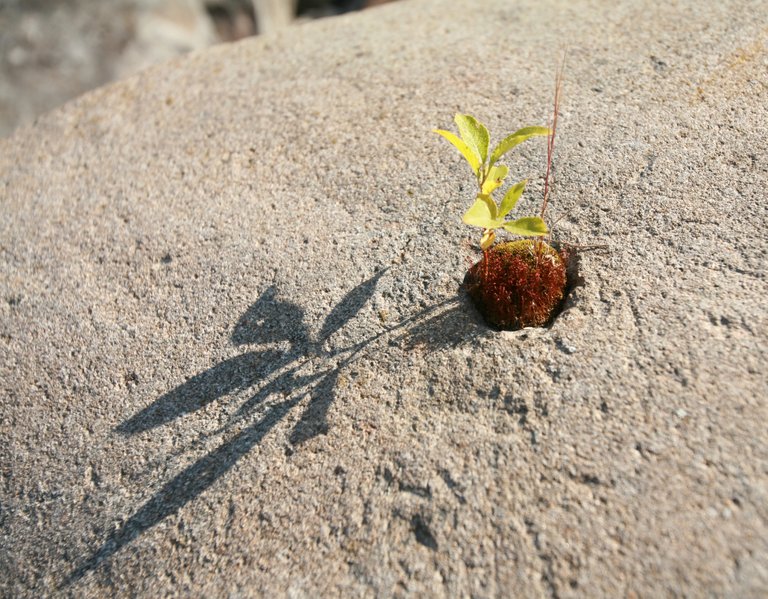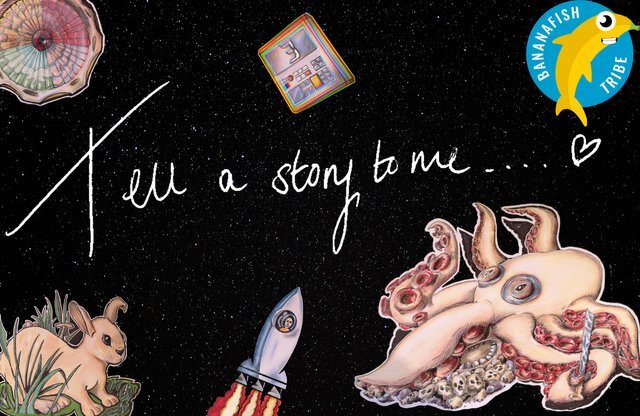
haiku by Radostina Dragostinova (Bulgaria)
Welcome to the September English edition of the Bananafish haiku contest!
Nice to meet you again, after a relaxing vacation in the sunny Salento and some (less relaxing) Steemit HF 21 issue.
For this edition, we have a meaningful photo provided by @qwerrie! Thank you very much!
Here is how this contest works:
A photo is posted.
You write a haiku inspired by that photo with your own post (use #haikucontest as your first tag) or a comment in the comment section.
You can read other’s haiku and vote for one of them, answering to the special Bananafish comment in the comment section.
The authors of the Best Haiku, Popular Choice, and Best Vote Comment WIN 5 STEEM, 5 SBI & 1000 SNAX!
@f3nix tireless work and the vital support by @curie and @crowdmind allow us to keep the amount of prizes up for grabs, which continue to include the SNAX token (see below).

The Prizes:
Check out Crowdmind's Interview with the team from the SNAX blockchain as well as our previous post.
To receive your SNAX rewards, you'll need to have a SNAX wallet. The best one so far is Nabla app.
Otherwise, you can use Snax.One
Here's a tutorial with photos. on how to set a Snax.One wallet.
Courtesy of our partners, @Crowdmind, we're now also giving away SNAX tokens!
So, the prizes now are:

The requirements:
• The haiku should be related to the prompt image.
• A haiku has no title.
• The haiku should be in English, or include an English translation.
• The English haiku form is: a short (3-4 syllable) verse, a longer (5-6 syllable) verse, another short (3-4 syllable) verse.
• There should be the kireji (切れ字), a cut between the 1st and the 2nd verses, or between the 2nd and the 3rd; the cut can be grammatical, as a sign of punctuation, or it can be a cut in the meaning, like two different images.
• The time window to post your haiku and cast your votes is up to the payout of this post.

Prompt Image:


Do you want to know how we evaluate the submitted haiku? These are the characteristics we search for:
• Kigo (季語), an explicit or implicit reference to a season, that defines the time of the year in which the haiku is composed or referred to.
• Sabi (寂), the sense of the inexorable passage of time, the beauty or serenity that accompanies the advance of age, when the life of the objects and its impermanence are highlighted by patina and wear or by any visible repairs.
• Wabi (侘寂), the taste for frugal and natural things, rustic simplicity, freshness or silence; it can be applied to both natural and artificial objects, or even non-ostentatious elegance.
• Mono no aware (物の哀れ), empathy with nature and human life; the "feeling of things", nostalgia, regret for the passing of time, understanding of the changeability and of the transience without suffering.
• Yūgen (幽玄), sense of wonder and mystery; it represents the state of mind produced by the inexplicable fascination of things, the feeling of an 'other' universe, full of mysterious unity.
• Karumi (軽み), beauty in simplicity; poetic beauty reflected in its simplicity, free from preconceptions and moral judgment.
• Shiori (しおり), gentleness; the levity and the delicate charm that radiates from the verses, where things are evoked in the reader without aggressiveness or excessive explicitness.

The cancellation of the "Ego"
Welcome back to the usual appointment with haiku theory. Much of my small and extremely simplified texts derive from the reading of the writings of Luca Cenisi, perhaps the highest Italian authority on the subject haiku, and from chats with Corrado Aiello, who runs a haiku study group on Facebook, and with Valeria Simonova-Cecon, a Russian senryū expert who lives in Italy. I don't want to claim the full authorship of what I write, it would be presumptuous.
Years ago, Luca Cenisi himself lent me a book that spoke of fūryū. In the past four editions we have seen that the fūryū applied to haiku consists of four expressive aspects: sabi (impermanence in time), wabi (impermanence in space), mono no aware (feeling of things) and yūgen (symbolism).
Another very important essential character of the haiku is the so-called "cancellation of the author’s ego".
Roland Barthes said that haiku has no subject. This does not mean eliminating any personal reference, in fact we see that all the most illustrious haijin, starting from the classic triad Bashō - Buson - Issa, have written numerous haikus in which they speak about themselves in first person.
However, when the poet also appears in the haiku, she is never the protagonist and does not impose her own moral interpretation on the contemplated event; she does not try to express a meaning by force.
Take for example this Kobayashi Issa haiku:
気の毒やおれをしたふて来る小てふ
kinodoku ya ore wo shitōte kuru ko chō
I pity you
for following me
little butterfly
The masculine pronoun ore means "I" and indicates an informal and familiar relationship with the interlocutor. The attention of the reader is not focused on the protagonist, but on the empathy that is formed between the poet and the butterfly. It symbolizes the link between man and nature and the contemporary presence of the two in the instant in which the haiku was born. It expresses the awareness of being part of nature, one of the many subjects present, not the principal or the one who is called to express an opinion or an interpretation of the event.
Therefore, it would be more accurate to speak of "deconstruction of the ego", not cancellation: the individual takes a step backwards and the difference between the subject that perceives and the object that is perceived is transcended, because the relationship of "empathy" between them becomes more important.
For the same reason, in haiku we try to express feelings and emotions without mentioning them directly. A descriptive or narrative approach would be a too strong form of subjectivism. Naming joy, sadness, anger, etc., it would be coarse and raw.
Instead, an attempt is made to recall the sensations in the reader through a process of suggestion. The poet must "abandon herself", diverting attention from herself and creating a kind of emptiness in which the sensations are alive but undefined.
A lesson by Matsuo Bashō, reported by his disciple Hattori Dohō, said: "learn from the pine to be a pine, learn from the bamboo to be a bamboo". In other words, the haijin needs to move away from the point of view centered on self, and identify with the object of the observation, becoming one with it. In this way, according to Bashō, we reach the makoto (truth, genuineness).
Bashō, following the Zen Sōtō tradition, placed a certain emphasis on the mythized figure of the master, indicating that only poetic practice in harmony with the principles of the Shōmon School or becoming one with the thought of the Master (himself) could lead to makoto. This trend can also be found today in many forms of art, in particular the martial arts, of Japanese derivation.
Starting from the reforming work of the Kawahigashi Hekigodō School, and in particular the haijin Ogiwara Seisensui (1884-1976), haiku has progressively opened up to a more subjective and sentimental vision. So, in the modern haiku the author's impressions and emotions make their way, but always with that lightness and non-invasiveness that try not to bend the truth to rationality, logic or morality, but let emotions flow in total symbiosis with nature.
We could conclude this topic, and more generally the whole subject on the content elements of the haiku, saying that the characteristic that emerges as most important is the omission: in haiku it is necessary to be much more careful about what not to say rather than what to say. We must suspend all perceptive automatism, rediscover innocence and the absence of judgment, not seeking the truth through intellectual and interpretative mechanisms, but through the moment of contemplation.

Good haiku to everybody!
Your bananafishous haiku herald


Let’s the Bananafish Tribe grow together!

With delegations, Bananafish VP will grow and consequently the upvotes given to every contest entry will be higher.
Following the voting trail is a way to make sure you always support the other participants to the Bananafish contests, automatically upvoting the posts (but not the comments) Bananafish upvotes.
Join the Bananafish Realms on Discord and chat with us: https://discord.gg/ZWmEUWT
If you’re interested, here you can find all the information needed.

[banner credit: @f3nix]
Other Bananafish awesome contests and creative works (click on the banners):





The seed grows,
Too where, no one knows,
Marijuana.
Welcome to Mizu No Oto!
Dry is the ground;
Yet, determination moves in the baby plant;
Magic in the making.
Determination and magic make the world go around!
This is a very nice haiku about @qwerrie's photo.
Exactly.
Caught this Marco, just in time!
Evocative picture. I love your exposition. Here's my response:
The shadow
Lengthens at day's end
Ripe fruit rots
I am a bit divided on your haiku, because on one hand it is beautiful, on the other I believe that the photo does not represent a fruit, but a hole in the stone where a small fertile layer has formed.
Hi Marco:
Sorry, I still see a strawberry that has fallen into sand. Don't see a rock at all. Must be some kind of visual disconnect. My granddaughter, daughter and son claim I have a bit of a spatial deficit (innate, not age related). Maybe that's it. Thank you for saying the haiku is beautiful. I thought, after I posted, that a better word for 'rot' could have been used. Not exactly a beautiful, inspiring image.
Glad to see the contest going strong. So many people are enriched by writing haiku. Including me :)
Finally! this one was very slow to emerge.
I know your purpose
tiny sun drenched forest:
ark of creation
https://steempeak.com/haikucontest/@owasco/the-other-thing
I only participate for the fun of it. Then I read your poem, and some of the others, and realize how it should be done. Wonderful.
I really love writing these! I don't always succeed, and once I didn't finish until after the deadline. Thank you so much for your appreciative comment.
Greetings, friends of Mizu no Oto. I leave you my participation in this edition. Good luck!
https://steemit.com/steempress/@josemalavem/myparticipationinmizunooto-everyimagehasitshaiku-edition37english-g4h563oriy
Stone hardness,
softness of the shoot
and its shadow
Perfect
I leave here my participation this week.
This is my exercise: https://steemit.com/haikucontest/@gracielaacevedo/mizunooto-everyimagehasitshaiku-edition37english-y9tjwa13z4
the shadow of the germ.
Wonderful
Mi entrada al concurso: https://steemit.com/haikucontest/@solperez/mizu-no-oto-every-image-has-its-haiku-edition-37-english
Hola, amigos del universo haikú!
Esta es mi ejercicio de la jornada:
https://steemit.com/haikucontest/@oacevedo/mizunooto-everyimagehasitshaiku-edition37english-ehv0gc8lww
Among the sunny stone
His shadow blooms
Saludos.
Hi guys, my entry https://steemit.com/haikucontest/@marcybetancourt/mizu-no-oto-every-image-has-its-haiku-edition-37-english
Under your shadow
I will rest.
Greetings and much love to all. Here I leave my participation:
https://steemit.com/haikucontest/@zeleiracordero/mizunooto-everyimagehasitshaiku-edition37-vv1042i529
vibrates in the air
the shadow grows
Mi participación: https://steemit.com/haikucontest/@acostacazorla/mizu-no-oto-every-image-has-its-haiku-edition-37-english. Suerte para todos.
oh yes here it is. Somehow I missed it earlier. Thank you for such a wonderful haiku.
Great hope!
Under your shadow
I will rest.
Me gusta cómo hace que la piedra cobre vida, la dota de emociones y esperanza, de alivio y descanso... La verdad es que al dejame a mí mismo reposar en su poema, me he sentido piedra yo también; ja, ja...Hola! Quiero dar primero las gracias a @sacra97 por etiquetarme a modo de invitación en su participación, casi se me pasa un concurso que no me quiero perder nunca, pues me encanta. Normalmente me gusta preparar mi poema antes de emitir mi voto, pero esta vez estoy probando todo lo contrario... Acabo de leer todas las participaciones que hasta el momento se han presentado y hay tres que me gustaron por encima de las otras. Una es la de la propia Sacra97, otra la de @gracielaacevedo y la otra es de @marcybetancourt. Mi voto es para el poema de ésta última:
Great hope!
Under your shadow
I will rest.
I like how it makes the stone come to life, it endows it with emotions and hope, with relief and rest... The truth is that when I let myself rest in his poem, I have felt stone too; ha, ha...Hello, I want to thank @sacra97 first for tagging me as an invitation to participate, I almost missed a contest that I never want to miss, because I love it. Normally I like to prepare my poem before casting my vote, but this time I'm proving the opposite... I have just read all the entries that have been submitted so far and there are three that I liked above the others. One is from the Sacra97 itself, another from @gracielaacevedo and the other from @marcybetancourt. My vote is for that last one:
Gracias muy amable @salvao me ha encantado dar mi granito de arena, quien no se acordaría de ti, tus participaciones son especiales.
Thank you very kind @salvao I loved giving my grain of sand, who would not remember you, your participation is special.
Thank you @salvao for such beautiful words for my haiku. Excellent @sacra97 reminder for you. Solidarity, love, companionship and exchange, that's what steemit is all about. A big hello to you and @sacra97
Thank you @marcybetancourt muy amable
Without the participations did not open steemit, all of you make it possible grateful with your beautiful words
Sin las participaciones no habría steemit, todos ustedes lo hacen posible agradecida con tus hermosas palabras
There it is, my entry for this week:
https://steemit.com/spanish/@salvao/myentryformizunootoenglishedition37espeng-lbrly0t9qi
Me llamo luz.
Alimento las vidas
al dar el alba.
My name is light.
I feed the lives
when the dawn comes.
Good luck to all! :)
Hi @bananafish Nice photo for the contest. Thanks for sharing. Here is my entry:
For green sprout
hope is reborn!
Magic light.
https://steemit.com/haikucontest/@felixgarciap/my-entry-for-mizu-no-oto-every-image-has-its-haiku-edition-37-english
Yugen
:)
Apoyado resteem
Nature is wise, it can sprout from any corner and place
I put here for you my interpretation of photography my haiku. I am excited about the photo courtesy of @qwerrie that gives us a message, life springs up anywhere, it is very beautiful. The @bananafish team performs and maintains the challenge with great effort. Visit and support the participants, they put heart and enthusiasm.
https://steemit.com/haikucontest/@sacra97/my-entry-for-mizu-no-oto-every-image-has-its-haiku-edition-37-english
valuable corner,
life value
I dont understand kireji. Example?
Some example from Matsuo Basho:
the first cold shower [kireji]
even the monkey seems to want
a little coat of straw
After the first verse there is a change, like two sentences divided by the end of the first verse. We could put a period or a semicolon. In Japanese there are some words that do the same thing.
the wind of Fuji [kireji]
I've brought on my fan
a gift from Edo
spring going— [kireji, often marked with a hyphen]
birds crying and tears
in the eyes of fish
how cool the feeling
of a wall against the feet — [kireji]
siesta
Thank you for your contribution to the crowd. We are the Steem community project dedicated to empowering The Wisdom of Crowds. You can find more about us on our official website or whitepaper and you can support us by voting for our witness and joining our curation trail on Steemauto . We are also inviting you to join Crowdmind Discord server. Don't forget to use the #crowdmind hashtag and happy crowdsourcing!
Nature is very stubborn.Beautiful photo of @qwerrie this week.
Having read the haiku exercises of the week, I must say that everyone has a lot of essence, in my opinion, and whoever wins, is well deserved. However, I choose the one from @solperez as my favorite.
Vote your favorite haiku:
It is fascinating the explosion of poetry that in this edition of Mizu No Oto has led to the photography of @qwerrie with its simple and admirable beauty. I have passionately enjoyed each of the creations of the haijin. I really liked the haikus of @josemalavem, @gracielaacevedo, @acostacazorla, @salvao, @solperez, @zeleiracordero, @marcybetancourt and @owasco. I vote for the exercise of @owasco because, in a very poetic way, in it I perceive the voice of omniscience allowing us to travel back in time to the forest that contains the budding tree and symbolizes it as the strength of everything created.
Es fascinante la explosión de poesía que en esta edición del Mizu No Otohaijin
ha propiciado la fotografía de @qwerrie con su simple y admirable belleza. He disfrutado con pasión cada una de las creaciones de los . Me han gustado de manera sobresaliente los haikus de @josemalavem, @gracielaacevedo, @acostacazorla, @salvao, @solperez, @zeleiracordero, @marcybetancourt y @owasco. Voto por el ejercicio de @owasco porque, de manera muy poética, en él percibo la voz de la omnisciencia permitiéndonos viajar en el tiempo hacia el bosque que contiene el árbol en ciernes y lo simboliza como fortaleza de todo lo creado.
my favorite haikus
@solperez, @salvao, @felixgarciap
almost all of us agree with the extraordinary birth of a plant on a rock, its resistance is almost a miracle, the eye that found this wonder highlights the greatness of the force in nature
casi todos coincidimos de los extraordinario del nacimiento de una planta en una roca, es casi un milagro su resistencia, el ojo que encontro esta maravilla resalta la grandeza de la fuerza en la naturaleza @bananafish
Very difficult to choose this week!
On a stone,
the shadow of the germ.
Wonderful @gracielaacevedo
Hi @bananafish and greetings to all participants. This week I really like the haiku of @acostacazorla because it contains the wonder of creation (divine purpose). However, my winning haiku is for @josemalavem because each verse is fantastic and makes a sublime poem.
The beautiful photo of @qwerrier has propitiated the contemplative vision and the visualization that allowed the writing of exercises of much sensory and reflexive quality. I observed two fundamental trends: one that is fundamentally descriptive of reality from a humble astonishment, and another that recognizes the wonder of creation contained in that simple and surprising reality. I liked the exercises of @zeleiracordero, @oacevedo, @owasco, @gracielaacevedo, @solperez, @acostacazorla and @marcybetancourt. It is not an easy task to decide. I opt for @oacevedo.